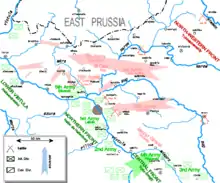
Initial Soviet advance during the Battle of Warsaw.
The Battle of Warsaw was a decisive Polish victory in 1920 in the Polish–Soviet War. Poland, on the verge of total defeat, suddenly rebounded and defeated the invading Red Army, then pushed it back. It was, and still is, celebrated as a great victory for the Polish people over Russia.
Quotes
- As a result of the Soviet hopes of world revolution or, at least, ideological expansion into Central Europe, the Polish victories near Warsaw between 16 and 25 August 1920 were a key incident in the Cold War. The Battle of Warsaw ended the drive west by the Soviets, a drive which had already led them to capture the cities of Minsk and Vilnius the previous month. Had the Soviets succeeded in 1920 and established a sister republic in Poland, on the model of the French Revolutionaries in Italy, Switzerland and the Netherlands, then Communism would have had an opportunity to become more strongly grounded.
- Jeremy Black, The Cold War: A Military History (2015)
- In this episode, as with the post-1945 conflicts more classically seen as part of the Cold War, the struggle between the Great Powers was indirect: even in the Korean War (1950–3), there was no declaration of war or full-scale conflict. In 1920, the French provided the Poles with useful supplies and military advice, but there was no commitment of troops. Instead, the Poles benefited from their ability to gain the initiative, and then defeat separately the Soviet forces whose coordination was handicapped by mutually-distrustful Communist generals and by lengthy supply lines. Advancing over a very wide front and reliant on long supply lines, the tired Soviet forces lacked depth and nearby reserves. This was a very different situation to their successful fighting advance across this territory against the Germans in 1944. Prior to the Battle of Warsaw in 1920, Soviet strength seemed particularly potent and threatening, and it was unclear whether it would be possible for the Western powers to stop Soviet expansion short of full-scale war. What containment (to employ a later term) could mean in practice was unclear. In the event, after the battle, the Poles, in turn, advanced to within ninety miles of Kiev, before agreeing an armistice. The eventual Treaty of Riga, in March 1921, left Poland with some territory in modern Lithuania, Ukraine and Belarus, and with a frontier far to the east of modern Poland.
- Jeremy Black, The Cold War: A Military History (2014)
- If Charles Martel had not checked the Saracen conquest at the Battle of Tours, the interpretation of the Koran would be taught at the schools of Oxford, and her pupils might demonstrate to a circumcised people the sanctity and truth of the revelation of Mahomet."
"Had Pilsudski and Weygand failed to arrest the triumphant advance of the Soviet Army at the Battle of Warsaw, not only would Christianity have experienced a dangerous reverse, but the very existence of Western civilisation would have been imperilled. The Battle of Tours saved our ancestors from the Yoke of the Koran; it is probable that the Battle of Warsaw saved Central and parts of Western Europe from a more subversive danger – the fanatical tyranny of the Soviet.
"On the essential point, there can be little room for doubt; had the Soviet forces overcome Polish resistance… Bolshevism would have spread throughout Central Europe and might well have penetrated the whole continent.- Edgar Vincent D'Abernon [citation needed]
- Again and again, Poles rose against their occupiers, only to be savagely put down, with their finest young men slaughtered or marched to Siberian prisons. Then, at the end of the Great War, Poland suddenly reappeared on the maps. What did the Poles do? They immediately saved Western civilization yet again. In the now-forgotten "Miracle on the Vistula," a patched-together Polish army turned back the Red hordes headed for Berlin. One of history's most brilliant campaigns, it saved defeated Germany from a communist takeover. Poland's thanks? The slaughter of World War II. Then the Soviet occupation.
- Ralph Peters, "Shafting the Poles", originally published in the New York Post, December 23, 2003.
See also
External links
This article is issued from Wikiquote. The text is licensed under Creative Commons - Attribution - Sharealike. Additional terms may apply for the media files.
